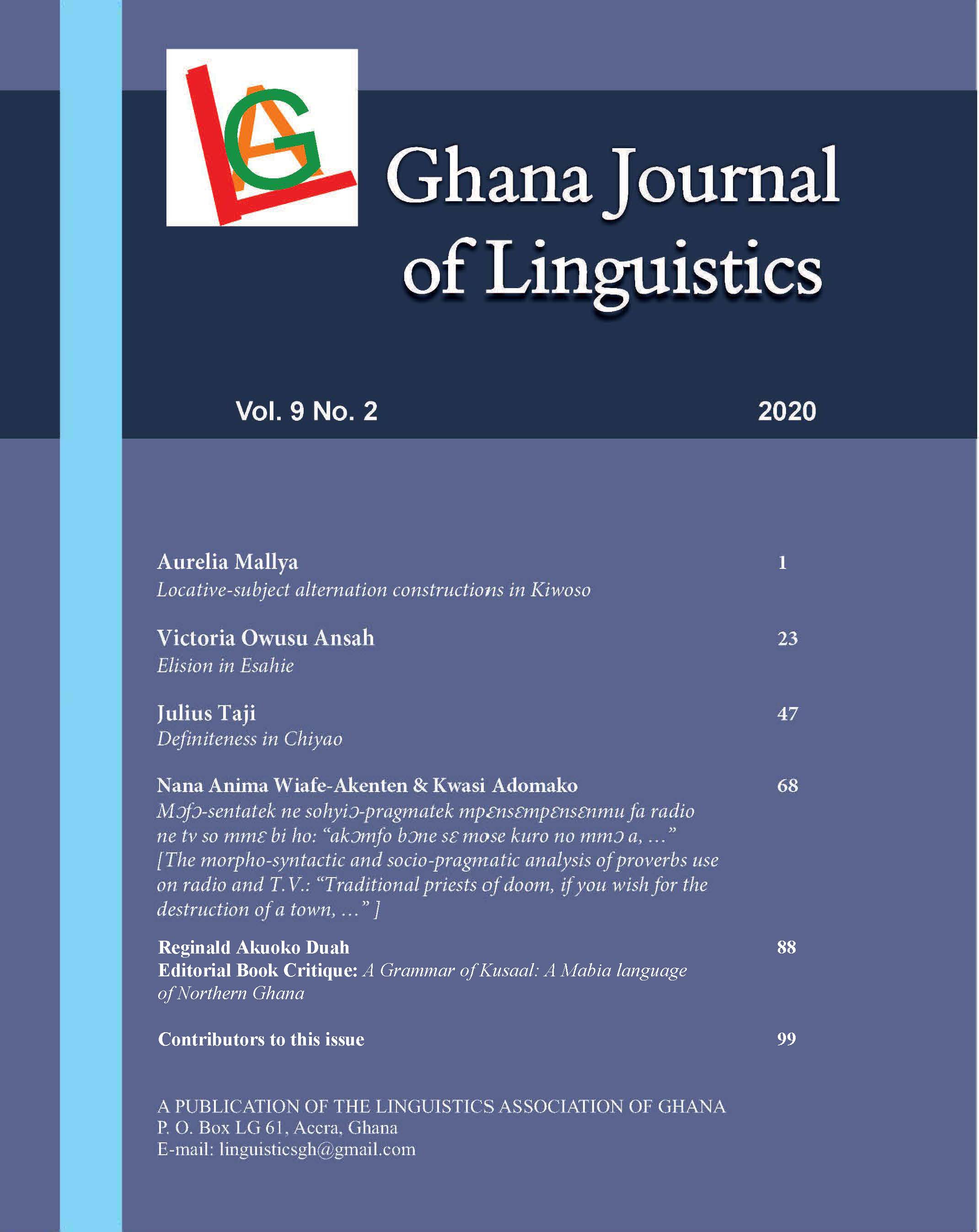Locative-subject alternation constructions in Kiwoso
DOI:
https://doi.org/10.4314/gjl.v9i2.361Keywords:
Morphosyntax, Bantu language, Kiwoso, locative inversionAbstract
Locative subject alternation constructions show variation within and across languages in terms of subject agreement pattern and the type of predicates involved. In Kiwoso, the preverbal locative DPs with and without locative morphology are best analysed as canonical subjects, as evidenced by the subject diagnostics, such as subject-verb agreement and its occurrence as a subject of passive verb and relative verb clauses. The examined examples demonstrate that the postverbal subject neither behaves like canonical subject nor shows features of canonical object in that it cannot passivize in alternation constructions or appear on the verb as an object marker (i.e., cannot be object marked). However, there is strong evidence to suggest that the preverbal locative (subject) DP in Kiwoso locative-subject alternation constructions is a grammatical subject. As in most languages, locative-subject constructions in Kiwoso serve a pragmatic-discourse function of presentational focus. The locative subject argument of the locative-subject alternation constructions is interpreted as a topic, whereas the postverbal thematic subject of these sentences is understood as focus. The postverbal subject provides information which is usually discourse new in relation to preverbal locative DPs. The data examined from Kiwoso challenges the view that formal and semantic locative inversions cannot co-exist in a single language.
References
Bresnan, Joan and Jonni Kanerva. 1989. “Locative inversion in Chichewa: A case study of factorization in grammar.” Linguistic Inquiry 20 (1):1-50.
Bresnan, Joan. 1994. “Locative inversion and the architecture of universal grammar.” Language 70 (1):72-131.
Buell, Leston. 2007. “Semantic and formal locatives: Implications for the Bantu locative inversion typology.” SOAS Working Papers in Linguistics 15:105-120.
Buell, Leston. 2012. “Class 17 as a non-locative noun class in Zulu.” Journal of African Languages and Linguistics 33:1-35.
Carstens, Vick. 1997. “Empty nouns in Bantu locatives.” Linguistic Review 14:361-410.
Creissels, Denis. 2011. “Tswana locatives and their status in the inversion construction.” Africana Linguistica 17:33-52.
Demuth, Katherine and Sheila Mmusi. 1997. “Presentational focus and thematic structure in comparative Bantu.” African Languages and Linguistics 18:1-19.
Diercks, Michael. 2011. “The morphosyntax of Lubukusu locative inversion and the parameterization of Agree.” Lingua 121 (5):702-720.
Guérois, Rozzen. 2014. “Locative inversion in Cuwabo.” ZAS Papers in Linguistics 57:49-71.
Harford, Carolyn. 1990. “Locative inversion in Chishon.” In Current Approaches to African Linguistics, edited by J. Hutchison & V. Manfred, 137-280. Dordrecht: Foris.
Kagaya, Ryohei. and Olomi Rogati. 2009. A Kiwoso Vocabulary. Tokyo: Research Institute for Languages and Culture of Asia and Africa (ILCAA), Tokyo University of Foreign Studies.
Khumalo, Langa. 2010. “Passive, locative inversion in Ndebele and the unaccusative hypothesis.” South African Journal of African Languages 30 (1):22-34.
Languages of Tanzania Project (LoT). 2009. Atlasi ya Lugha za Tanzania. Dar es Salaam: Dar es Salaam University Press.
Machobane, Malillo. 1995. “The Sesotho locative constructions.” African Languages and Linguistics 16:115-136.
Maho, Jouni. 2009. NUGL Online: The online version of the New Updated Guthrie List, a referential classification of the Bantu languages. Consulted online on June 2019 at http://goto.glocalnet.net/maho papers/nuglonline.pdf.
Mallya, Aurelia. 2016. Argument realization, causation and event semantics in Kiwoso. Unpublished Doctoral thesis, Stellenbosch University, South Africa.
Marten, Lutz. 2006. “Locative inversion in Otjiherero: More on morphosyntactic variation in Bantu.” ZAS Papers in Linguistics 43:97-122.
Marten, Lutz. 2010. “The Great siSwati Locative Shift.” In Continuity and change in grammar, edited by Anne Breitbarth, Christopher Lucas, Sheila Watts and David Willis, 249-267. Amsterdam: John Benjamins.
Marten, Lutz. 2011. “Information structure and agreement: Subjects and subject markers in Swahili and Herero.” Lingua 121 (5):787-804.
Marten, Lutz. 2012. “Agreement in locative phrases in Luganda.” In Proceedings of the 6th World Congress of African Linguistics, edited by Matthias Brenzinger and Anne-Maria Fehneds, 433-443. Cologne: Rüdiger Köppe.
Marten, Lutz. 2014. “The preverbal position(s) in Bantu inversion constructions: Theoretical and comparative considerations.” ZAS Papers in Linguistics 57:136-159.
Marten, Lutz. and Hannah Gibson. 2016. “Structure building and thematic constraints in Bantu inversion constructions.” Journal of Linguistics 52 (3):565-607.
Marten, Lutz. and Jenneke. van der Wal. 2015. “A typology of Bantu subject inversion.” Linguistic Variation 14 (2):318-368.
Marten, Lutz. Nancy Kula and Nhlanhla Thwala. 2007. “Parameters of morphosyntactic variation in Bantu.” Transactions of the Philological Society 105:253-338.
Zeller, Jochen. 2013. “Locative inversion in Bantu and predication.” Linguistics 51 (6):1107-1146.
Zerbian, Sabine. 2006. “Inversion structures in Northern Sotho.” Southern African Linguistics and Applied Language Studies 24 (3):361-376.

Downloads
Published
How to Cite
Issue
Section
License
Copyright (c) 2020 Aurelia Mallya

This work is licensed under a Creative Commons Attribution 4.0 International License.
The Ghana Journal of Linguistics is published by the Linguistics Association of Ghana, P. O. Box LG 61, Legon, Accra, Ghana.
LAG Email: linguisticsgh@gmail.com. Website: http://www.laghana.org
GJL Email: gjl@laghana.org Website: http://www.laghana.org/gjl
© Linguistics Association of Ghana and individual authors, 2023.
